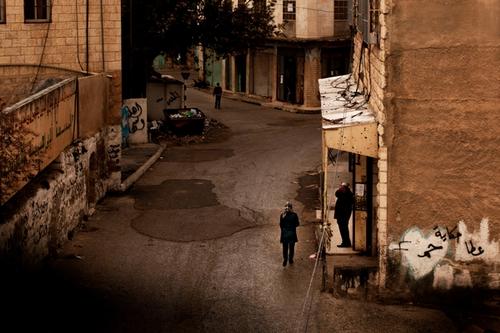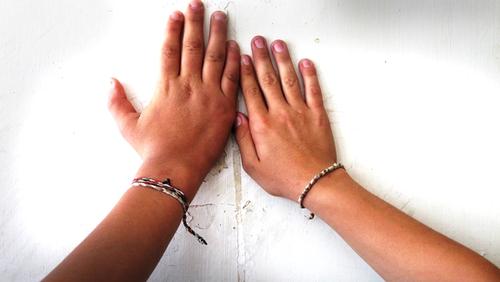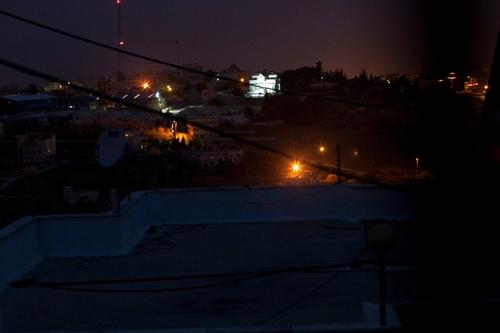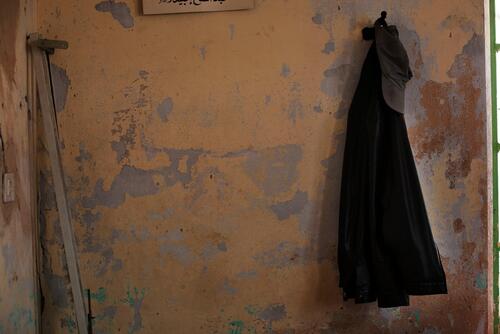Yaqub was shot with live ammunition after some of his colleagues threw stones at some soldiers. Yaqub needed the support of MSF specialists to start accepting that he will never walk again.
Yaqub is 17 years old. He lives with his family in Al Fawwar refugee camp, which was established in 1950 for refugees after what is referred to by Palestinians as Al Nakba (the catastrophe) in 1948. The refugee camp now houses 7,000 people and is a hotspot for clashes with Israeli forces. At the beginning there were 14,000 people, but half of them have moved to Jordan. They come from the Palestinian villages of Iraq Al-Manshiyyah, Beit Jibreen, Tal As-Safi, Samu’el, Falujah, Deir Adubbn, Aker, Al-Masmiyyah,Deir Nakhass, Beit Mahseer, Ajoor and Qbeibah.
Just two kilometres from the camp is an Israeli military base, A watchtower is a permanent reminder of the base to everyone in the camp Beside the base and four kilometres away, is the Israeli settlement of Hagai, which occupies 400 square kilometres.
But none of this concerned Yaqub on 9 January four years ago. He had just finished an Arabic exam and was getting ready to play football with his colleagues. Like most of his friends he was crazy about football. But there were four or five soldiers near the school and some children started throwing stones at them. The soldiers responded by shooting. With live ammunition.
Yaqub doesn't remember much about what happened because he lost consciousness. He woke up at the hospital. The bullet went through his abdomen, hit his spinal cord. He would no longer be able to walk, though no one told him this at first. Instead the doctors told him he was in critical condition and needed to be referred for further treatment to Jordan, where he spent 75 days.
As soon as he was home, his mother had to break the news to Yaqub, He would have to use a wheelchair from now on. Yaqub couldn't believe it. He directed his anger at his mother, and he beat her, threw tantrums, and broke things around him in the house. He wasn't sleeping; he shouted and cried every day for many days.
In June, Yaqub's mother asked MSF for advice. “I remember the psychologist and the translator that came to see me. They helped me with the anger,” he says. He was also placed in the care of an MSF doctor.
Yaqub now spends a good deal of time at his uncle's garage, and watches how his uncle and cousins mend cars. Since he finished his treatment with MSF, he has found a new occupation, a plan for his future. He likes to take care of birds. He has two injured birds in a cage, and he spends much of his time with them. “I sometimes feel that I am like the birds in the cage, not able to fly. But then, I hope that I will soon have an electric wheelchair that will allow me to fly, to fly without wings all over OPT [Occupied Palestinian Territory].”

Family and hunger strike
MSF Prisoners’ families usually need psychological attention. Women, mothers, fathers, children, they are all affected by the absence of the prisoner. Adel’s case, who went into hunger strike, worsened the condition of his family. Adel was on a hunger strike for 105 days in protest at being kept in prison without an official sentence. He had no idea when he would be released. After six months in prison, he was given another six-month period in jail. Adel has been in and out of Israeli prisons for 10 years and as a result, he has accumulated many health problems. His family has also been affected.
An MSF psychologist visited the family after Adel began his hunger strike. Both his wife, Rania, aged 32, and his mother Yousra, aged 62, were suffering from depression and had sleeping problems. Adel and Rania have four children, between six months and 13 years old. All but one have been born while their father was in prison. One of the children has a medical condition which has caused great distress for the family.
Rania's pregnancy was even used by authorities as a way to put pressure on her husband. “They came and detained me, asking many questions. I was pregnant and I tried to be strong for the sake of my children,” she says.
Sometimes there were rumours that Adel was suffering, or dead. “That was horrible for everybody, the worst, but especially for the children,” says Rania. “And my mother-in-law, Yousra, who is very strong, started to experience all-over body spasms, and she couldn't stop crying, she didn't go out anymore, she didn't talk to anybody anymore. We weren't sleeping at all.”
MSF teams started working with the two women. They encouraged them to express their feelings and fears and also ensured information about Adel's health came from the reliable sources. The psychologists also gave them tools to talk to the children and help them cope with their father's situation.
Their sleeping patterns improved and they began to manage the stress a bit better. But the improvement was inconsistent, largely because of the news of Adel's health, which was quickly deteriorating, and also because of external factors such as new incursions and detentions in the area.
One of the worst episodes was a raid on the house of one of Adel's brothers. The soldiers took pictures of the children as the children slept. When Rasnia's family hear this, the children were again the most affected, and felt threatened and angry.
It was only after Adel decided to end his hunger strike – he reached an agreement and was administratively sentenced – that his family’s lives began to improve. They started to see some hope for the future, and reestablished relationships with neighbours and family in preparation for Adel's release.
Occupied Minds is a series of stories about Médecins Sans Frontières (MSF) patients affected by the Israeli-Palestinian conflict, people receiving assistance from MSF mental health teams in Hebron and in East Jerusalem. The stories are collected by the MSF teams. Occupied Minds seeks to reflect the reality of daily life under occupation for MSF patients and the people who treat them






